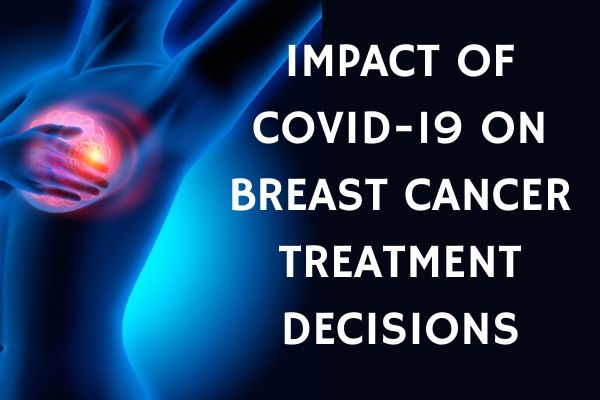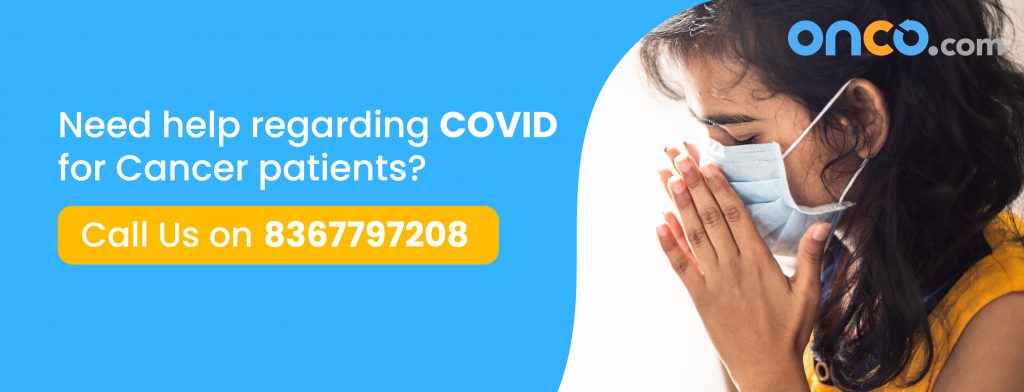Dr Deepak Koppaka is a consultant medical oncologist at Care hospitals, Hyderabad. He did his Doctorate of Medicine in Medical Oncology at Kidwai Cancer Institute, Bangalore and is a member of American Society of Clinical Oncology (ASCO), Association Of Radiation Oncologists Of India, European Society For Medical Oncology and Indian Society Of Oncology. He has contributed various publications in medical and radiation oncology for malignancies such as that of the blood, lungs and breast.

Patients diagnosed with breast cancer undergo tremendous anxiety, emotional and psychological stress. Complicating the current times further COVID-19 pandemic poses unprecedented challenge for breast cancer patients, physicians and the healthcare system. TO help patients overcome these tough times we have come up with information regarding the best practices in the current crisis period.
Overall precautions to be taken by breast cancer patients undergoing treatment right now
As per the current available evidence patients with cancer have an increased risk of severe complications when infected with corona virus than the general population. Precautions cancer patients need to take during this period include:
- Wash your hands frequently
- Avoid touching face
- If you cough or sneeze use a tissue and throw away the tissue.
- Avoid contact with people who are sick
- Use household cleaning sprays or wipes to clean frequently touched objects/surfaces.
- Social distancing to avoid contact with asymptomatic carriers of the disease
- Do not Leave your residence unless absolutely essential
- Have a stock of the essential cancer medicines such as hormonal or targeted therapy for at least a month.
- If on regular visits to the hospital prefer telemedicine services rather than in person visits.
Stage-wise guidance for breast cancer treatment during COVID19 pandemic
- Patients diagnosed with preinvasive lesions of the breast after surgery can wait for adjuvant radiotherapy till the pandemic subsides.
- Patients with low risk early stage breast cancers i.e. hormonal receptor positive early stage breast cancers can wait for a period of 6 weeks for the pandemic to subside for undergoing further treatment.
- Patients post neoadjuvant chemotherapy i.e. patients undergoing chemotherapy prior to surgery need to undergo surgery on a priority. Patients having advanced breast cancers and patients harbouring high risk breast cancers such as HER2 positive and triple negative breast cancers should ideally undergo chemotherapy as planned and avoiding undue delays.
- Elderly Patients with hormonal receptor positive breast cancers post surgery can be started on adjuvant hormonal therapy rather than chemotherapy in case of smaller tumours.
- Patient presenting with metastatic disease leading to organ dysfunction need to be started on chemotherapy upfront without undue delays. In patients harbouring hormone receptor positive disease with metastasis patients can be started on hormonal therapy rather than on chemotherapy.
To handle the limited hospital resources and staff during these tough times, worldwide, the management of breast cancer patients has been prioritised based on the urgency of treatment. High priority includes patient condition that is life threatening, clinically unstable, or treatment that leads to significant improvement in survival. Medium priority includes patients with non-critical situations but delay beyond 6 weeks could impact the overall outcomes. Low priority includes patient with stable condition and treatment can wait till the COVID pandemic is overcome.
| High Priority | Medium Priority | Low Priority | |
| Imaging & Diagnosis |
|
|
|
| Surgery |
|
|
|
| Radiotherapy:
Hypo-fractionation preferred |
|
|
|
| Chemotherapy: Early and locally advanced breast cancer |
|
|
|
| Chemotherapy: Metastatic Breast cancer |
|
|
|
Can we postpone treatment for breast cancer? If yes, then for how long can we delay further treatment?
Surgery
Surgery can be delayed in patients having benign breast lesions. In patients with locally advanced breast cancers can be treated with systemic therapy and surgery can be delayed till the end of neoadjuvant systemic therapy. If patients who have completed neoadjuvant chemotherapy it is advised that surgery should not be delayed in these group of patients.
Chemotherapy
In low risk elderly patients with hormonal receptor positive breast cancers chemotherapy can be avoided. In patients with locally advanced triple negative and HER2 positive breast cancers chemotherapy with or without targeted therapies needs to be continued. In patients with failing to achieve a pathological complete response adaptive therapies such as TDM-1 or capecitabine needs to be continued. In patients with HER2 positive breast cancers achieving pathological complete response to neoadjuvant therapy currently on maintenance Trastuzumab, the therapy can be deferred for about 6 weeks.
Radiotherapy
Hypo fractionated radiotherapy is currently preferred during this crisis period. In patients on radiotherapy the treatment needs to be continued. IN patients on palliative treatment for severe pain or bleeding radiotherapy needs to be given on a priority basis. Adjuvant radiotherapy can be delayed for 6 weeks in patients with low risk breast cancers. In patients with DCIS (preinvasive cancers) post-surgery radiotherapy can be avoided during this crisis period.
Precautions for patients undergoing chemotherapy or radiotherapy
- Patients and attendants needs to be screened and viral exposure risk questionnaire needs to be enquired at the front office during check-in.
- Encourage and enforce hand-washing guidelines.
- Maintain social distancing.
- Avoiding non-essential items (Magazines etc.) in the clinic.
- Follow strict appointment schedule to avoid crowding in the clinics.
- Encourage tele-consultations as and when possible.
- Discuss the alternate treatment options with your treating oncologists such as delaying treatment, changing chemotherapy from a weekly schedule to a three weekly schedule etc.
- Report immediately if features of febrile neutropenia are evident such as fever, cough, severe throat pain, abdominal pain, diarrhoea after chemotherapy administration.
What are the risks of continuing treatment and risks of withholding treatment of breast cancer in the present situation?
Risks of undue treatment continuation
- Patients are at increased risk of Exposure to COVID-19 infection
- Patients diagnosed with cancer and infected with COVID-19 are at increased risk of complications
- Chemotherapy might lead to neutropenia and decreased immunity leading to increased risk of complications
- Neutropenia induced chest infections might rarely mimic COVID-19 changes in the lung
Risks of withholding treatment
- Risk of cancer progression
- Risk of loss of treatment efficacy due to undue delays
- Uncertainty regarding the end of this pandemic


